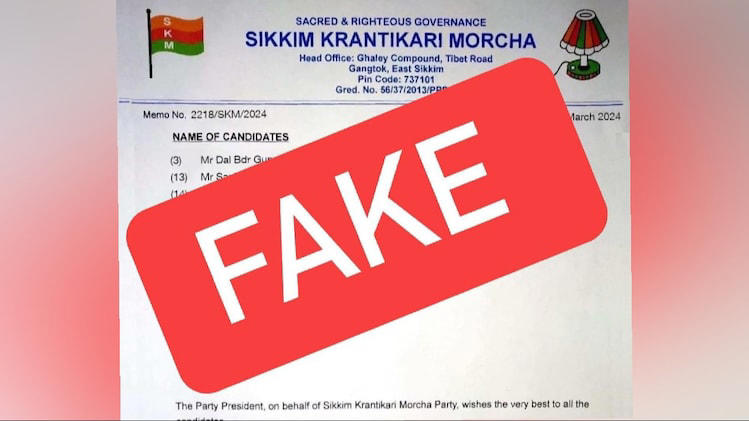Recently, the Sikkim Krantikari Morcha (SKM) Party found itself embroiled in a controversy when a purported list of candidates surfaced on social media platforms. However, the party swiftly took action to debunk the false information, highlighting the importance of vigilance against misinformation in the political landscape.
Sikkim, nestled in the lap of the Himalayas, has always held a unique position in Indian politics. The state’s political dynamics have evolved over the years, with parties like the Sikkim Krantikari Morcha emerging as prominent players. Founded in 2013, the SKM Party has aimed to challenge the political hegemony in the state, advocating for transparency, accountability, and good governance.
In the run-up to elections, especially in regions with fervent political engagement like Sikkim, the dissemination of candidate lists holds significant weight. These lists are pivotal for voters, providing crucial information about the individuals contesting for various positions. However, the rise of social media platforms has made it easier for misinformation to spread like wildfire, often leading to confusion and distrust among the electorate.
The recent incident involving the dissemination of a fake candidate list on social media served as a wake-up call for the SKM Party. The fabricated list purported to represent the SKM’s official candidates for the upcoming elections, causing a stir among party members and supporters. However, the party’s leadership promptly sprang into action, recognizing the potential damage misinformation could inflict on their electoral prospects and the trust of the electorate.
The SKM Party swiftly issued a statement denouncing the fake candidate list circulating on social media platforms. Party officials clarified that the list was entirely fabricated and did not represent the official candidates endorsed by the SKM Party. Through various communication channels, including press releases and social media posts, the party endeavored to set the record straight and reaffirm its commitment to transparency and integrity in the electoral process.
Moreover, the SKM Party took proactive measures to counter the spread of misinformation. Utilizing its extensive network of volunteers and supporters, the party launched a robust social media campaign to debunk the fake candidate list. This campaign involved disseminating accurate information about the party’s endorsed candidates while cautioning the public against falling prey to false narratives propagated on social media platforms.
The incident not only highlighted the challenges posed by misinformation but also underscored the SKM Party’s unwavering dedication to upholding democratic principles. By swiftly addressing the issue and transparently communicating with the public, the party demonstrated its commitment to honesty and accountability, traits that resonate with voters seeking genuine representation.
In the broader context of Indian politics, the incident serves as a reminder of the growing influence of social media in shaping political discourse. While social media platforms offer unprecedented opportunities for political engagement and information dissemination, they also present significant challenges in combating misinformation and maintaining the integrity of the electoral process.
Political parties across the spectrum must remain vigilant and proactive in countering the spread of fake news and misinformation. By investing in robust communication strategies and fostering a culture of transparency, parties can mitigate the impact of false narratives and ensure that voters are well-informed when making their electoral decisions.
In addition, the Sikkim Krantikari Morcha’s swift response to the dissemination of a fake candidate list on social media platforms exemplifies the importance of vigilance and transparency in the face of misinformation. As political parties navigate the complex landscape of modern politics, it is imperative that they prioritize truth and integrity, thereby safeguarding the democratic ideals upon which our society is built.

